Rat Control of San Antonio
Welcome to Rat Control of San Antonio! We are Texas rodent control specialists. Our specialty is rat and mouse control. Our special 32-point process is the single most effective method in the country for permanently solving rodent problems inside houses and buildings. We are not a typical pest control San Antonio rodent exterminator company that treats rodents in a similar way to insects, with repeated monthly or quarterly poison treatments. That's a never-ending process. We solve the problem ONCE, and PERMANENTLY, by thoroughly inspecting every component of your building and completely sealing shut all access points, to 100% rodent-proof your house. We physically trap and remove all rats or mice, a process that is completely effective once all access has been closed. The problem is soved forever, usually in a week or less. Click on our San Antonio Prices page to find out more about our prices for rat control work. Or give us a call any time to schedule an appointment, usually within the next day. We look forward to hearing from you.
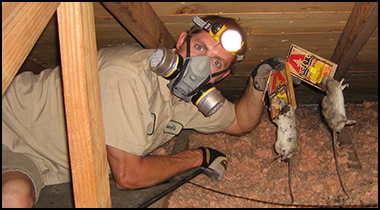
San Antonio Rat Trapping

Rodent-Proofing Repairs
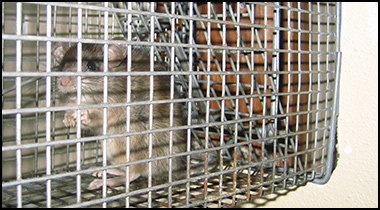
Humane Exclusion Options
Call 24/7 to discuss your rat problem.
Same-day or next-day appointments: 726-202-2048
32-point inspection of your property.
Written estimates for rat project.
Fully Texas licensed and insured.
Rat-proofing repairs with steel.
100% of rodents trapped and removed.
Chewed wire and damage repair services.
Rat dropping cleanup and sanitation services.
Poison-free rodent control methods.
Our Service Range - 726-202-2048
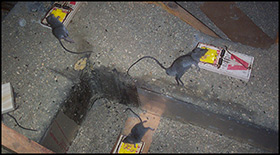
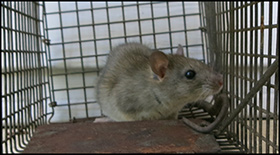

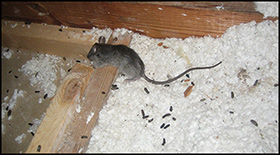
Rats eat any and everything. They even eat their own feces, mainly for its nutritional content. Some female rats even eat their babies if it is deformed, or the population is too large and there is a lack of food available. Rats are omnivores, preferring meats, dairy products and vegetables over fruits and sugary food. There are rats that live in large fields and farms and those that live in the city. The natural diets of rats usually depend on where they reside.
Rats are not very funny eaters. Those living on farms where there are fields of crop, feed on wheat and corn. They also feed on fungi, other types of vegetables, seeds and fruits and insects of they need to survive. Farm rats would even partake of the food that is being fed to other animals on the property and maybe even the animals feces. Some city rats dwell underground in the sewers which have become a source of nutrition for them as well. Yup, feces of humans (bleehh). The would scavenge through garbage and eat anything that is either meat or plant based. Rats that live in the wild would hunt smaller animals such as fish, birds and reptiles, as well as consume plants.
Rats are attracted to found from the scent that it gives off. The more interesting the scent, the more the attraction. Hence the reason why rats may be found over dead carcasses and dwelling in highly scented areas such as the sewer and the garbage dumps. They are most likely to hunt for food at night, preferring the cover of darkness for fear of being caught by predators. Even so, they are nocturnal creatures, so they are most active at night, using this time to forage for a diet made up of carbohydrates and proteins.
Rats have front teeth that grow quickly, and they need to gnaw excessively on things so that they teeth do not grow out of control. Even though they may not be hungry, they gnaw at anything they can put their teeth on such as your furniture, wood and wiring. Unfortunately, rats excrete waste as much as they chew. Usually, they use their feces and urine to mark their territory, but it comes in handy when they have poor vision, using their pheromones to guide them.
There are no known natural diets that are exclusive to rats. As mentioned before, they eat practically anything with some nutritional value and their surroundings play a part in what their diet is made up of. Rats held in captivity, domesticated rats, rats living in urban areas, rats living in rural areas and rats living in the forest, all have their natural diets. If a city rat was relocated to the forest, it would not survive for very long because it would not know how to hunt for food or where to search. Although rats have a lifespan of 2 to 3 years, they can survive for up to 4 years if kept as pets.

